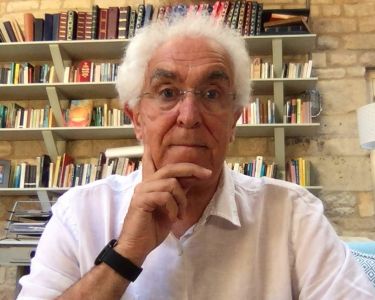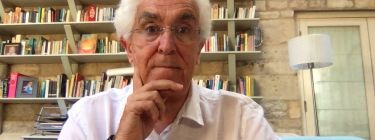
Poetics in the Remaking of Europe
Writer, cultural activist and Emeritus Professor of Literature at University of East Anglia
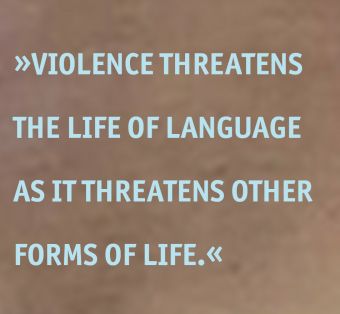
Poetics in the Remaking of Europe
In 1951 the German philosopher, Theodor Adorno, published an essay called ‘Cultural Criticism and Society’. One remark in it, often taken out of context, made the essay famous: “After Auschwitz to write a poem is barbaric.” Whatever controversies it provoked, and however much Adorno subsequently changed his thinking about the relation between poetry and society, his comment remains emblematic of an important intuition. Language, and its expressive potentials, are not immune from historical events. Language has a distinctive life and social being, a life which can be enhanced, damaged or, in some of its forms, made obsolete. Violence threatens the life of language as it threatens other forms of life.
It is worth recalling the context that provoked Adorno’s remark. The holocaust remains at its dark centre, but, between 1939 and 1945, 36 million Europeans lost their lives in war related deaths. Many of the dead were civilians. The loss of life amongst Russians was greatest and more people died in eastern than in western Europe. But, however you analyse the numbers, what happened was probably the greatest act of human self-slaughter in history.
We may live in ignorance of these numbers and their implications. Or we may know about them and choose to ignore them. Or we may remember them in terms of certain images that we think are very much of the past: ruined cities, vast numbers of refugees, the dead and the scarcely living bodies of the Holocaust. That was Europe then and we live in a different place now. Wasn’t the post-war European renaissance precisely to do with the construction of a political order expressly designed to keep the peace? Hasn’t this been its most durable achievement?
We can answer those questions in different ways. One response might acknowledge that Europe had to come close to annihilation in order for that peace to be constructed at all. The memory of violence had to stay vivid for political energy and ambition to be directed towards the creation of a peaceful order. Now that memory has diminished, an important question for the next European renaissance is how the impetus for peace-making will be maintained. Another response, amongst the many causes of the violence that led to the slaughter of 1939-45, was a way of talking about the world that emphasised a wounded nationalism, that identified threats in alien others, and sought solutions in authoritarian leaders. Different media and different contexts were involved from films to newspaper articles to informal conversations.
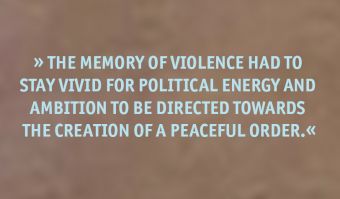
These diverse means of communication created a multiplier effect. Xenophobia, racism and authoritarianism became the focal points of a collective imagination. Whatever else may have changed since this period, the thought that these ways of talking have been overcome in a new peaceful Europe is clearly false. If anything, they are on the rise, but in a way that still seems oddly oblivious to their possible consequences. A new European renaissance needs to take account of this fact: the way we talk to each other is consequential. It’s one of the many ways that we make the world we live in.
Some commentators at the time of the European conflagration were sensitive to this linguistic dimension. The English writer, George Orwell, was one. He saw that the totalitarian regimes that caused such havoc needed to control language and, by their control, to gaslight whole populations in order to maintain power. Albert Camus, Hannah Arendt, and Ceslaw Milosz all shared a similar sense of the importance of the way we talked to each other and our capacity to treat each other humanely as ends in themselves and not just means to an end.
Adorno was concerned with the violence that could be done to language, Orwell with the violence (and control) that certain kinds of language enable. For both, this heightened their sense of the conditions in which language might live or become dead and
deadening. Orwell valued a plain clear style as the condition of language’s vitality. Adorno valued the dialectical potential of a language that could put in question what it was saying and how it was saying it. Both opposed the use of jargon and the tendency of language to congeal into fixed vocabularies and routine gestures. All large organisations, the EU included, have a tendency to speak in ways that Adorno and Orwell opposed. The corporate speech of the early 21st century unconsciously echoes the language world of Orwell’s 1984 in its repetitiveness, its tendency to settle into slogans, and its closing down of thought in the name of consensus. But how might we find alternatives? This will importantly depend upon our own inventiveness with language and a willingness to give up on certain forms of ‘authoritative speaking’ that seem increasingly threadbare to those on their receiving end of them. Our own inventiveness can draw on many resources as we imagine how we might speak to each other in ways that are both democratic and expressive. Europe invents itself through many languages and not just one. In this repeat it is a little like another multilingual society, India. How we respond to this reality not as a deficit or a problem, but as a source of cultural enrichment and opportunity is one challenge for the next European renaissance.
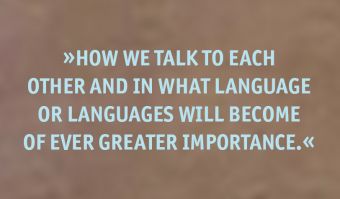
For Merleau Ponty le langage parlant is a creative state, but it also affirms and recreates a social bond. It becomes what he describes as a “gesture of renewal and recovery which unites me with myself and others.” While he finds examples of this kind of language in literature it is by no means confined to a specialised form of creativity. The experience of “renewal and recovery” occurs for the speaker and the listener, for the individual and the collective. To utter le langage parlant is a potential in all of us, but one that circumstance can easily damage or restrict. It also marks the moment when language comes alive.
The first European renaissance marked a great transition in language in its affirmation of the expressive power and the literary dignity of different vernacular languages that were destined for a while to become the different national languages of Europe. The next renaissance will perhaps move in another direction, one that has been described as a colonial phenomenon, creolisation, where different languages and cultures mix and mingle. How we talk to each other and in what language or languages will become of ever greater importance. A ‘poetics for Europe’ will foster the conditions for a langage parlant made out of the interaction between different languages and cultures. One of its hallmarks will be the understanding that in saying something we are always doing something and that one of the things we are doing is recreating or dissolving the conviviality that can connect us one to another.
Jon Cook
Jon Cook is a writer, cultural activist and Emeritus Professor of Literature at the University of East Anglia. He was educated at Cambridge University and the University of East Anglia. He has published a number of books and essays that, in different ways, focus on the question of what makes language creative. From 2008-2017 he was on the governing body of the Arts Council for England. He has taught at universities in the US, Europe and India and is currently involved in a project to create an arts and humanities curriculum for the 21st century. In 2021 he was appointed an Honorary Fellow of the Royal Society of Literature. He currently lives near Stroud in Gloucestershire and hopes it will not be too long before the UK rejoins the EU.
